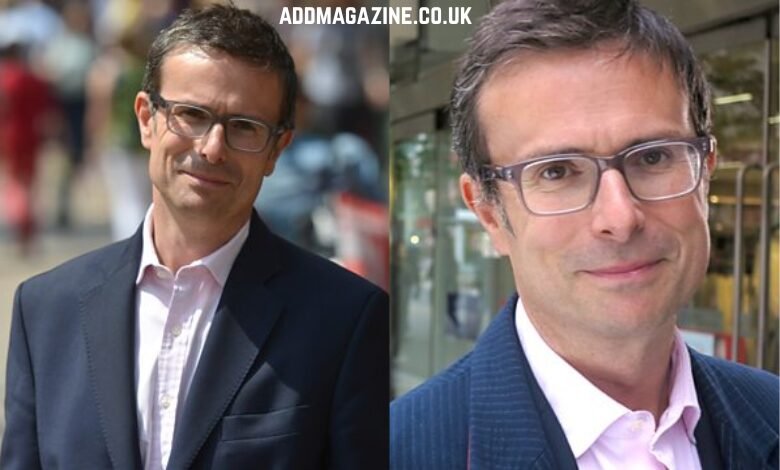Robert Peston, one of the most recognized names in British journalism, has spent his career navigating the often tumultuous worlds of politics, business, and economics. As the political editor for ITV, Peston’s sharp intellect and rigorous questioning style have earned him both accolades and criticism. Yet, behind the camera and the headlines, Peston’s personal story is a narrative of emotional resilience, grappling with grief, and confronting his own health challenges. One of the most pivotal chapters of his life unfolded not in the public eye, but within the confines of a hospital room, as he faced an illness that would change his understanding of himself and his life.
The Roots of Robert Peston’s Mental and Emotional Struggles
Peston’s public persona is that of a driven, ambitious journalist with a sharp eye for detail and an ability to challenge the political status quo. However, in an interview reflecting on his life and health, Peston has openly discussed the inner challenges that have shaped his path. These challenges, both mental and emotional, were present long before his physical illness took hold.
Growing up in a noisy, culturally vibrant Jewish household in Crouch End, North London, Peston’s childhood was anything but quiet. As the oldest of three children, he quickly learned to take responsibility for others. He recalls an early sense of duty to “fix everyone’s problems,” a trait that he believes may have become one of his defining flaws. Being a problem-solver was ingrained in him from a young age, but it also meant he rarely took the time to simply listen to others or even to himself. This inclination to fix things, to be the one with the answers, was not just a childhood trait—it became a framework for how he approached both his personal and professional life.
In retrospect, Peston has speculated that his experiences and behaviors might align with symptoms of ADHD. His restless energy, frequent accidents, and impulsive tendencies were clear signs from an early age, yet they were never formally diagnosed. The emotional and mental undercurrent of his life was one of constant motion, and this restlessness played a significant role in shaping both his personal relationships and career trajectory.
A Breakdown: Peston’s Health Crisis
Despite his tendency to keep busy, Peston was not immune to the toll that unresolved trauma and grief can take on the body. In fact, the onset of his serious health issues came at a time of immense personal pain. Following the death of his wife, Sian, Peston was forced to confront a deep and lingering sorrow that he had previously pushed aside by staying occupied with work.
This emotional burden manifested itself in an alarming physical breakdown. Peston was hospitalized with a rare and debilitating condition that left him unable to move. His joints swelled, and he experienced intense pain—both physical and emotional. It was, as Peston described it, a metaphor for his life at the time: his body was telling him to stop and deal with the grief and trauma he had long ignored. This period marked a turning point in his understanding of both his own health and the importance of confronting one’s emotional pain.
For someone who had built a career on his intellect and ability to manage crises, the illness served as a stark reminder that one’s body and mind cannot be compartmentalized indefinitely. Peston’s illness was not just a physical ailment; it was a manifestation of years of emotional neglect. The period of his life when he was most dedicated to fixing everyone else’s problems had ultimately left him broken in ways that even his formidable intellect could not solve.
The Role of Work in Peston’s Coping Mechanism
In the aftermath of his wife’s death, Peston did what many people do in the face of overwhelming grief: he threw himself into work. For him, the constant demands of his job as a journalist became a way to keep his mind occupied and to stave off the pain of loss. Yet, as he has since acknowledged, this approach was flawed. It was an attempt to avoid confronting the real emotional issues he was facing.
Work, while a powerful distraction, can never fully replace the necessity of emotional healing. Peston now understands that healing requires more than just action; it demands reflection, vulnerability, and ultimately, closure. The physical breakdown that accompanied his grief served as a brutal wake-up call that no amount of work could mend the emotional wounds he had been ignoring.
The Relationship Between Mental Health and Physical Illness
Peston’s experience is a testament to the profound connection between mental and physical health. His illness, which left him bedridden and incapacitated, was not just a reaction to physical strain—it was a reflection of the unresolved emotional turmoil he had been carrying. The experience of being unable to move, of facing intense joint pain, and of feeling trapped in his own body, forced Peston to reckon with the reality that emotional health cannot be separated from physical well-being.
In recent years, there has been growing awareness about the relationship between mental and physical health, with numerous studies demonstrating how emotional stress and trauma can manifest as physical ailments. Peston’s health crisis serves as a personal illustration of this connection. It highlights the importance of addressing mental health not as an afterthought, but as a crucial element of overall well-being.
Peston’s Resilience and Recovery
Despite the toll his illness took on him, Peston has shown remarkable resilience in his recovery. His commitment to work, while it may have been a contributing factor to his illness, also became a source of strength during his healing process. Returning to work after his hospitalization allowed him to regain a sense of purpose and control, but this time, with a greater understanding of the need for balance.
In his recovery, Peston has also come to appreciate the importance of vulnerability—something he had not always embraced in his public life. While his career has often been defined by his sharp intellect and probing questions, he has now become more open about his personal struggles. This vulnerability, he acknowledges, has made him a more compassionate and self-aware individual. In many ways, the illness and the grief that prompted it became catalysts for this transformation.
Interviewing Prime Ministers: A Shift in Political Journalism
As Peston’s health improved and he continued his work in journalism, he also reflected on the changes he had witnessed in the political landscape. Throughout his career, Peston has interviewed numerous prime ministers, from Tony Blair to Rishi Sunak. Yet, over time, he has noticed a shift in how politicians handle media interactions.
When he first began interviewing political leaders, there was a sense that they were more willing to answer questions, even if those answers were often carefully crafted. Over the years, however, Peston observed a growing tendency among politicians to avoid direct responses. Today, answering questions seems to be seen as a failure, with politicians more focused on delivering pre-prepared statements than engaging in a real dialogue.
This shift in political communication has mirrored some of the changes in Peston’s own life. Just as politicians have become more guarded and formulaic in their responses, Peston himself has learned to guard his own emotional well-being. His experience with illness and grief has deepened his understanding of the need for authenticity and emotional honesty, both in the political realm and in his personal life.
The Legacy of Robert Peston’s Story
Peston’s journey through illness and personal hardship is a reminder of the complexities of being a public figure. His health crisis, though intensely private, has shaped not only his personal life but also his professional outlook. As a journalist, he has always been known for his incisive questions and his ability to push politicians to be transparent. Yet, his own experience with illness has made him more attuned to the need for transparency in all aspects of life, not just in the public sphere.
As Peston continues his work and personal recovery, his story serves as an important lesson about the importance of confronting emotional pain, the need for balance in life, and the connection between mental and physical health. His illness may have temporarily interrupted his life, but it ultimately became a crucial part of his ongoing growth and understanding of himself and the world around him. In many ways, it has added depth to the narrative of a journalist who has long been known for his ability to analyze the world, but who has also learned the hard way to understand and heal his own.
Conclusion
Robert Peston’s battle with illness offers a profound reflection on the interplay between emotional well-being and physical health. His experience highlights how unresolved grief and trauma can manifest as physical ailments, reminding us of the importance of addressing mental health with the same urgency as physical health. Through resilience and self-reflection, Peston’s journey underscores the significance of balance, vulnerability, and confronting one’s emotional struggles.
In the end, Robert Peston’s illness and recovery not only shaped his personal growth but also influenced his professional perspective. As a journalist known for holding politicians accountable, Peston’s own struggle with vulnerability and emotional pain has deepened his understanding of authenticity—both in his career and in life. His story serves as a reminder of the human side of public figures and the need for compassion and self-care.
FAQs
- What caused Robert Peston’s illness?
Robert Peston’s illness was a result of emotional stress and grief following the death of his wife, Sian. - How did Robert Peston cope with grief after his wife’s death?
Peston coped by staying busy with work, though he later realized that avoiding emotional healing exacerbated his physical health issues. - Did Robert Peston have a formal diagnosis for ADHD?
No, Peston never had a formal ADHD diagnosis, but he speculates that his childhood symptoms aligned with the condition. - What impact did Peston’s illness have on his career?
His illness led to personal growth and a shift in how he approached his career, focusing more on balance and authenticity. - What changes did Robert Peston notice in political interviews over time?
Peston observed that politicians have become more evasive in interviews, often avoiding direct answers in favor of scripted responses.




